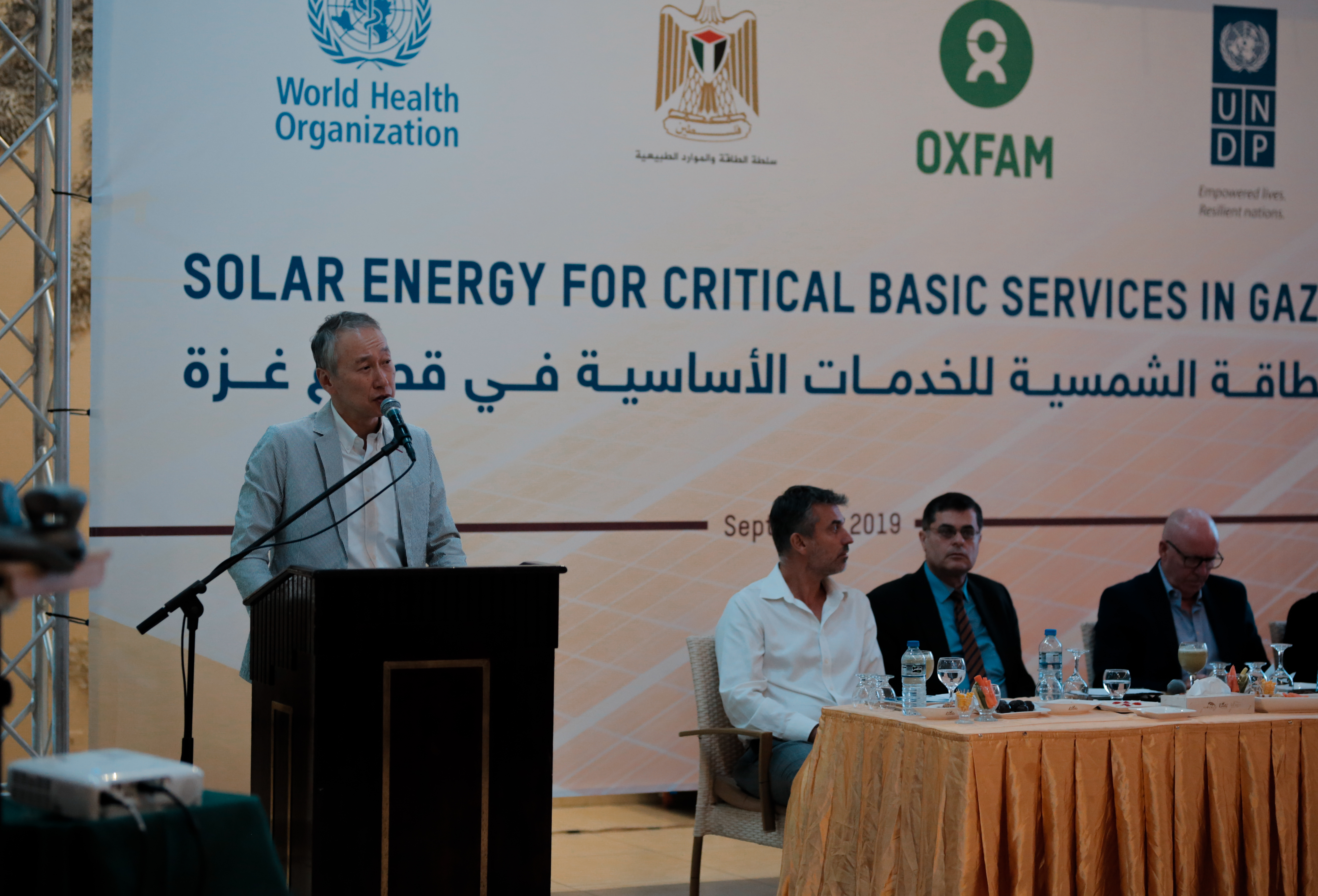Multi-Stakeholder Dialogue
Health, Education and Water and Sanitation Facilities Powered by Renewables in Gaza
September 4, 2019
Renewable Energy in Gaza: Simply Staying Alive
Gaza Strip, 04 September 2019 – Following a decade long electricity crisis, new assessment by UNDP’s Programme of Assistance to the Palestinian People, World Health Organization and OXFAM, charts pathways to utilize renewable energy to reduce dependence on fuel; sustain the provision of critical services and spur economic growth in Gaza. The meeting brought together key stakeholders from across the spectrum: policy makers, implementers, beneficiaries/users, donors, and investors to discuss recommendations for solar energy in Gaza.
UN Resident and Humanitarian Coordinator, Jamie McGoldrick highlighted that solar energy can support the important objective of transiting Gaza from a state of humanitarian response towards a more sustainable path.
It is estimated that around US$54 million worth of investment in renewable energy can enhance the resilience and service delivery of health, education, and water and sanitation (WASH) facilities, yield potential annual savings of up to US$11.3 million, and reduce CO2 emissions by 8.73 tons.
UNDP Special Representative of the Administrator, Yvonne Helle, said that power cuts have led to the breakdown of services and undermined Gaza’s fragile economy. “Number seven of the Sustainable Development Goals is about ensuring access to affordable, reliable, sustainable and modern energy for all. Yet, the population in Gaza only has access to electricity around 14-15 hours a day, and reliance on fuel to operate generators is high. This has dire consequences on those who are the most vulnerable: the children, the elderly, and those who are ill, or are infirm. Today’s hared endeavor is also about economic opportunities that investments in clean energy may bring,” she added.
Yvonne Helle, UNDP Special Representative
UN Resident and Humanitarian Coordinator, Jamie McGoldrick
Dr Gerald Rockenschaub, head of WHO
H.E. Takeshi Okubo, Japan Ambassador
The assessment was conducted in partnership with the ministries of Health and Education, as well as the Palestinian Energy and Natural Resources Authority (PENRA), over the October 2018 and May 2019 period. It examined 291 governmental school buildings, 409 water and wastewater facilities, as well as 15 hospitals and 51 primary health centres.
“The chronic electricity crisis in Gaza puts the lives of many patients at risk. We need to ensure that the delivery of essential lifesaving health services is not interrupted by power cuts,” said Dr Gerald Rockenschaub, head of WHO’s office for the occupied Palestinian territory. “Solar electrification of hospitals and primary care facilities is a feasible and sustainable solution to mitigate shortages of electricity supply and to reduce reliance on donated fuel to run emergency generators. The move to alternative energy sources is also an important step to support longer-term development efforts in Gaza and will contribute to build resilience of the health system”.
As a result of the assessment to the health institutes examined, the introduction of solar PV systems, combined with additional energy efficiency measures, is expected to yield annual savings in electricity costs of approximately US$ 2.6 million, and reduce CO2 emissions by 3.37 tons.
“The lack of concerted collective action to fix Gaza’s contaminated water, poor sanitation and inadequate electricity supply continue to perpetuate the public health risk for the people of Gaza, exacerbated by the blockade,” said Oxfam Country Director Shane Stevenson. “Solarising Gaza will help prevent children from becoming sick, young girls and boys who will suffer from the long-term effects of poor water quality, and who cannot wait for a political solution. We need to make a collective effort to raise funds to Solarise Gaza’s critical services and help keep families safe from disease and illness- the health of nearly two million people depends on it”.
The electricity crisis has had devastating consequences on the delivery of critical basis services, particularly in the areas of health, education, and water and sanitation in Gaza. While the international community has stepped in to provide funding for fuel to run generators, this is unsustainable from the environmental as well as financial perspectives. While the assessment findings shared at the meeting focuses on hospitals and clinics, water and sanitation facilities, and schools, recommendations are far-reaching. Stakeholders were invited to join the urgent and coordinated effort to propel a fundamental shift from full reliance on fuel, to investment in renewable energy sources such as solar.
****
The below links highlight the assessment findings that were shared at a meeting with the different stakeholders with particular focus on hospitals and clinics, water and sanitation facilities, and schools.
- Presentation: Solar for Critical Basic Services in the Gaza Strip (Health, Education, WASH)
- Solar Electrification of Health System in Gaza Report
- Summary Note: Assessment Findings and Strategy for Energy Transition in Education
- Summary Note: Assessment Findings and Strategy for Energy Transition in Health
- Infographic: Assessment Findings – Water, Sanitation and Hygiene (WASH)
- Infographic: Assessment Findings – Health
- Infographic: Assessment Findings – Education
- Map: Solar Energy Potential in Governmental Schools in the Gaza Strip
- Map: Solar Energy Potential in Health Facilities in the Gaza Strip
- PowerBi: Solar assessment for Primary Health Centers (PHCs)
- PowerBi: Solar assessment for Hospitals
- Renewable Energy Sources in Gaza's WASH Sector - OXFAM

 Locations
Locations









